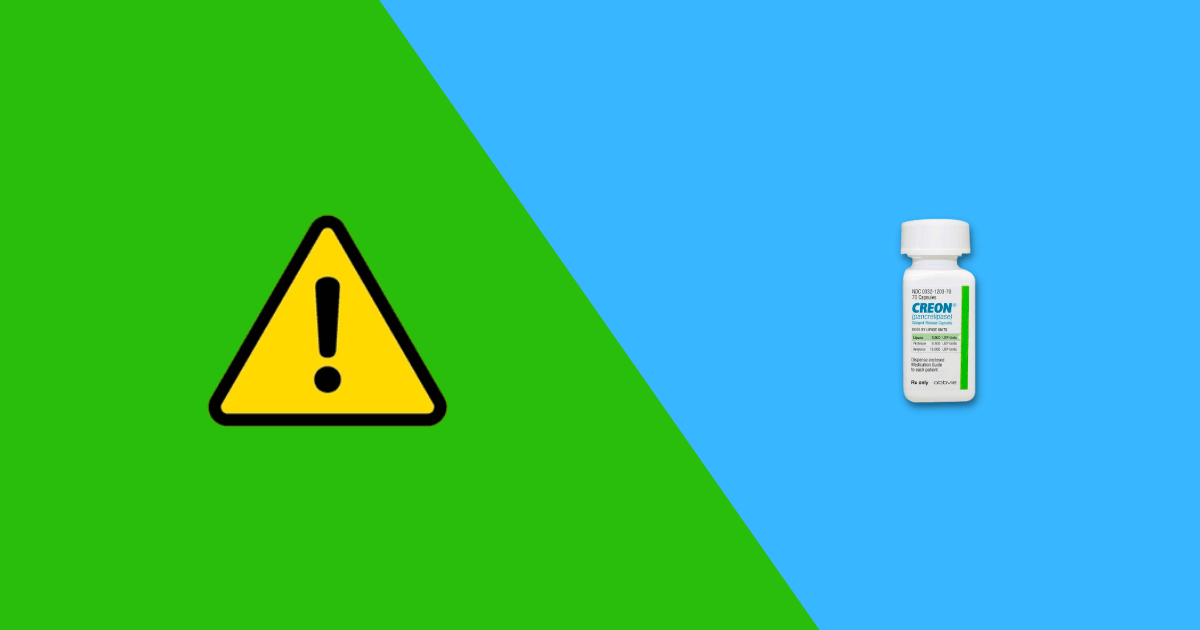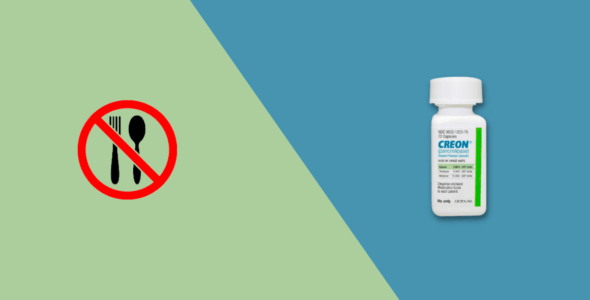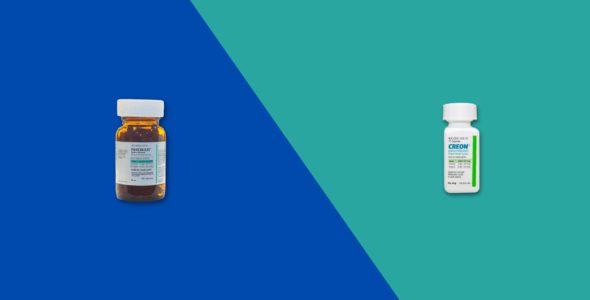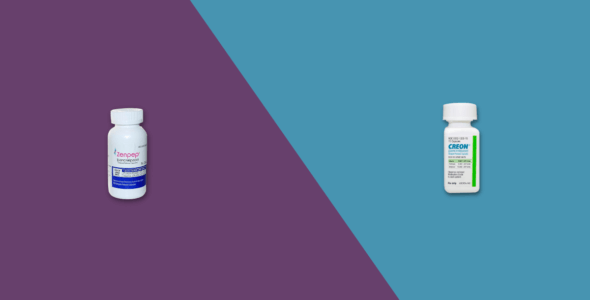Creon side effects and how to avoid them
Table of contents
Creon is an FDA-approved brand-name medication manufactured by Abbott Laboratories. It is classified as a pancreatic enzyme replacement therapy (PERT) and is used to help improve digestion by breaking down fats, starches, and proteins in your food. While Creon is generally well tolerated, there are some potential side effects that people should be aware of. The most common side effects of Creon include gastrointestinal side effects. Less common but more serious side effects can include serious allergic reactions.
Learn more about the side effects of Creon and what you can do to avoid them.
What is Creon?
Creon is a combination of porcine-derived lipases, proteases, and amylases as active ingredients. It can treat conditions such as cystic fibrosis, chronic pancreatitis, pancreatectomy, and pancreatic cancer, where your pancreas does not produce or release enough enzymes.
Creon releases high levels of lipase, amylase, and protease into the duodenum following activation by its alkaline pH. This facilitates the breakdown of fats into glycerol and free fatty acids, starches into dextrins and sugars, and proteins into amino acids and peptides. The effectiveness of Creon depends on several factors, such as the dose, your gastrointestinal pH, and the microsphere size of the medication.
RELATED: What is Creon
What does Creon do for the pancreas?
Creon replaces the 3 main pancreatic enzymes your pancreas would normally produce every time you eat.
How do you know if you need to take Creon?
If your pancreas doesn’t produce enough digestive enzymes, your body will be unable to break down the foods you eat, and you will not be able to absorb essential nutrients. This may cause malnutrition and symptoms such as diarrhea, gas, bloating, and cramping. Your doctor may carry out tests to check if you have sufficient enzymes produced by your pancreas if you have these symptoms.
What are the side effects of Creon?
The most common possible side effects of Creon include:
- Abdominal pain
- Headache
- Hyperglycemia
- Hypoglycemia
- Bloating
- Flatulence
- Vomiting
- Frequent bowel movements
- Constipation
- Dizziness
- Cough
- Sore throat
- Weight loss
Some serious side effects of Creon include:
- Fibrosing colonopathy (scarring of your colon)
- Worsening of a long-term pancreas problem
- Increase in uric acid levels
- Viral infection
- Allergic reactions (hives, face swelling, throat tightness, trouble breathing)
If you experience any of these serious side effects, stop taking Creon and seek medical attention immediately. You are encouraged to report the negative side effects of prescription drugs to the FDA. Visit www.fda.gov/medwatch, or call 1-800-FDA-1088.
Do Creon’s side effects go away?
Some of the less serious side effects of Creon may pass as your body adjusts to this medication. Speak to your doctor if you have more serious long-term side effects that will not go away.
Does Creon cause weight loss?
Yes. Weight loss is a side effect of using Creon
Does Creon cause gas?
Common side effects of Creon include constipation, diarrhea, headache, stomach pain, bloating, gas, nausea, and vomiting.
Does Creon cause diarrhea?
Common side effects of Creon include constipation, diarrhea, headache, stomach pain, bloating, gas, nausea, and vomiting.
Does Creon cause fatigue?
Yes. Creon may cause fatigue. Speak to your doctor if this side effect continues long-term or worsens.
Creon dosage
Creon is available as a delayed-release capsule formulation in the following doses:
- 6,000 USP lipase units; 19,000 USP units of protease; 30,000 USP units of amylase
- 12,000 USP lipase units; 38,000 USP units of protease; 60,000 USP units of amylase
- 24,000 USP lipase units; 76,000 USP units of protease; 120,000 USP units of amylase
Your dose will be based on your body weight or the amount of fatty food you eat. Do not switch Creon with other pancreatic enzyme products (such as Pancrease or Zenpep) without talking to your doctor. Take Creon capsules with a meal or snack, but make sure you don’t exceed your total daily dose.
If you cannot swallow capsules, open the capsule and sprinkle the contents on applesauce before consuming. Drink water or juice to be sure there is no Creon left in your mouth. If you forget to take Creon, skip the missed dose and take your next dose as scheduled. Do not double up your doses.
You are advised to read the medication guide provided with this medicine for drug information and patient information. Always speak with your healthcare provider for medical advice about any changes to your dose so they can monitor and evaluate your condition.
RELATED: Creon Dosage
What happens if you take too much Creon?
Any excess Creon your body does not need passes through your bowel and is excreted.
Creon drug interactions
While no drug interactions of Creon have been identified, you should make sure your doctor is aware of all the medications you take, including prescription drugs, over-the-counter medications, vitamins, and herbal supplements.
Creon’s warnings & precautions
You should not use Creon if you:
- Are allergic to pork or any pig products
- Have known hypersensitivity to Creon or any of its inactive ingredients
Talk to your doctor before using Creon if you:
- Have or have ever had fibrosing colonopathy
- Have or have ever had any intestinal blockages
- Have kidney disease
- Have gout
- Have high blood uric acid (hyperuricemia)
- Have trouble swallowing capsules
- Are pregnant or plan to become pregnant
- Are breastfeeding or plan to breastfeed – It is not known if Creon is excreted in breast milk
You should always check with your doctor or pharmacist before taking any medication, including Creon, to make sure it is safe for you.
Is Creon safe for pregnant women?
It is not known if pancrelipase causes fetal harm and should only be given to a pregnant woman if the benefits outweigh the risks.
What foods should be avoided when taking Creon?
You may need to make changes to your diet when taking Creon. Foods high in fat, protein, and carbohydrates may be difficult to digest and can make your symptoms worse. You should avoid:
- Foods rich in fiber such as lentils, barley, and brown rice
- Fried food
- Processed meats
- Alcohol
- Large meals – avoid large meals, instead eat 3 to 5 small meals each day
Speak to your doctor or dietitian about which foods you should or shouldn’t eat while using Creon. They will be able to help you create a healthy balanced diet plan that meets your dietary needs.
How to avoid Creon side effects
The best way to avoid side effects is to take Creon as directed by your doctor. Follow your doctor’s instructions carefully and do not take more or less than prescribed.
If you experience any side effects, talk to your doctor or pharmacist. They may be able to recommend ways to help reduce or prevent some of the side effects.
1. Stick to the recommended dosage
Take your prescribed dose of Creon that has been recommended by your healthcare professional. Do not take more or less than prescribed.
2. Monitor your blood sugar levels
If you have diabetes, it is important to monitor your blood sugar levels closely while taking Creon. Check your blood sugar levels as directed by your doctor and report any changes to your doctor immediately.
3. Drink plenty of fluids
Drink eight to 10 glasses of water or fluids every day to help prevent dehydration, which can worsen side effects.
4. Avoid alcohol
Avoid drinking alcohol while taking Creon, as it can increase your risk of stress and make your condition worse. Speak to your healthcare provider about alcohol consumption while receiving treatment with Creon.
5. Don’t skip meals
Eating regular meals and snacks will help to prevent low blood sugar levels (hypoglycemia).
6. Check your feet
If you have diabetes, check your feet regularly for any cuts, sores, or redness. Tell your doctor if you experience any problems with your feet while taking Creon.
7. Know the signs and symptoms of Creon’s side effects
Signs and symptoms of side effects include diarrhea, gas, and stomach pain. If you experience any of these symptoms long-term or if these side effects become worse, speak to your doctor for medical advice.
8. Monitor your weight
Creon may cause weight loss. If you experience this side effect while taking Creon, get medical advice from your doctor.
9. Tell your doctor about all medications you’re taking
Be sure to tell your doctor about all other medications you’re taking, including over-the-counter drugs, vitamins, and herbal supplements, as they can interact with Creon.
10. Get regular medical check ups
It is important to get regular medical check ups and monitor your medical conditions. Your doctor will monitor your side effects and may adjust your dose of Creon as needed.
Medically reviewed
A medical professional has reviewed this article.


Jamie Winn, PharmD
Jamie Winn, PharmD
Dr. Jamie Winn received his Doctor of Pharmacy in 2002 from the University of South Carolina College of Pharmacy, Columbia, SC. Jamie is a medical reviewer for NiceRx.





